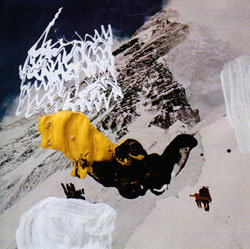
The argument of "Something from Nothing" ("The existence of any thing cannot have come from nothing or no thing, nor could it have ever existed at all") is a frequent topic in improvised music, particularly when speaking about Toshimaru Nakamura and his "no-input" work. Relying on EQ and volume tweaks sent into /out of effects units and back into the machine, he is proof of fluctuations in a void and a musical Big Bang. On the other hand, Oslo tabletop guitarist (here on acoustic 12-string) Havard Volden has ingested his instrument's history — including chapters written by Keith Rowe — circumvented the potential for dominance via amplitude and rendered it to a post-language whisper (yes, something to nothing).
Divided into two works with loaded titles ("Scattering", "Perception"), Crepuscular Rays (also a loaded name, as these pieces are cracks in the "twilight" between music, nature sounds and mechanical backgrounds) is a curious exercise in how to transform modest means to flamboyant to modest etc. Nakamura nudges and pans active charges and tickling, amoebic clicks into a relatively forceful pulse; to the left of the stereo field, Volden rubs and gently drags "objects" across the body of his instrument, producing a ringing metallic rattle as he infrequently bumps into strings. With a muster of wiggling electrical hiss from his counterpart, the guitarist occasionally strums notes on a muted soundboard and strikes / bends low tones to meet Nakamura's sub-bass interjections. Staccato fizzling screeches with independent echoes, subtle pitched feedback, Volden's tense, organic flanging vibrations and bowing come to a pause at twelve minutes; Nakamura reclines with a low volume 650 Hz tone (a frequency emitted by many sirens and soundcards) while Volden pensively fidgets with a gamut of taps, picked harmonics and (maybe) rubber band snaps.
They continue in this fashion for the entirety of the disc, simply exploring, reacting, conversing in an unassuming fashion, and never failing to find more interesting things to say — the more sonically obscure the better (i.e. grinding ostinatos that you might hear with your ear pressed to a goat's head while he chews a cud, the dancing egg timer at the midway point of "Perception"). However, apart from the stark chordal harmonic progression Volden carefully saves for the climax, the most weighted moments occur at transitions from old ideas to silence to new thoughts, as the sudden dropout of (insert sound here) forces you to pay attention, remember, mentally catalog, decide its importance, rewind to better understand and...
Confused? That's what happens when you're caught with groggy eyes and ears during the twilit moments of the day. And the gloaming of creation, oh you better believe reality is going to be a bit fuzzy for a few thousand years. Reality? These godlike contrarians care not for that word.
Comments and Feedback:
|



